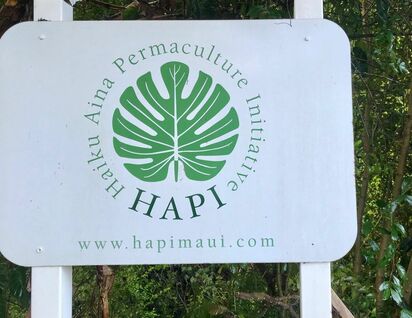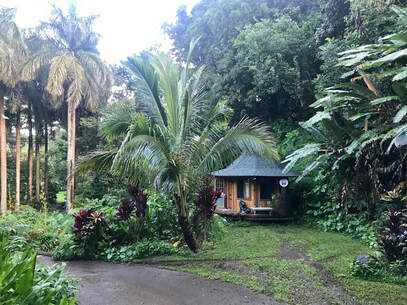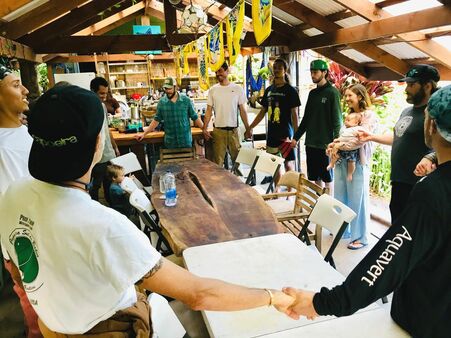Ha’iku Aina Permaculture Initiative

Ha: Breath of life that flows through all – the spirit
I: The self, interconnected to everything
Ku: Rising upright, also the name given to the rising sun
Permaculture: Study of natural systems and human living systems, integrating principles into human living systems for efficiency and productivity
Initiative: To initiate something new
- Adam Lottig, HAPI Agroforestry Resources Manager
To initiate something new is an endeavor admirable in any human’s life, especially with the intention of integrating natural system principles into human systems. We need to be thinking along these lines to heal our relationship with nature. My national permaculture research study initiated at the Ha’iku Aina Permaculture Initiative (HAPI) in Maui, HI. My family (husband, two-year-old River, and baby on the way) have been living at HAPI, for over three weeks. This will mark the longest stop of my six-month journey. The weeks have allowed me to better familiarize myself with tropical permaculture and find some much needed rest, reflection, email downtime, and isolation after more than seven wonderful years as a Sustainable Communities professor.
 I write from “the seed house.” Looking out the south window I see a ripening rack of bananas; the north window view includes hundreds of lemons ripening just outside the building. I hear the occasional ‘thump’ of an avocado falling. So it is here. What was once a eucalyptus dominated landscape lacking in diversity now boasts papaya, avocado, lemon, banana, mango, coconut, plantain, breadfruit, passionfruit, pineapple, ginger, turmeric, taro, chicken of the woods mushrooms, Cuban oregano, katuk, gotu kola, and much more.
I write from “the seed house.” Looking out the south window I see a ripening rack of bananas; the north window view includes hundreds of lemons ripening just outside the building. I hear the occasional ‘thump’ of an avocado falling. So it is here. What was once a eucalyptus dominated landscape lacking in diversity now boasts papaya, avocado, lemon, banana, mango, coconut, plantain, breadfruit, passionfruit, pineapple, ginger, turmeric, taro, chicken of the woods mushrooms, Cuban oregano, katuk, gotu kola, and much more.
At HAPI, a small set of managers and interns keep the ecosystem alive and thriving for plants, animals (including us humans), and fungi. Agroforestry, syntropic farming, and permaculture ethics guide the site design. Agroforestry involves incorporating trees and shrubs in crop and animal farming systems. The integrated system results in increased biodiversity and reduced erosion. Syntropic farming was popularized by Ernst Gotsch out of Brazil, looking to create resilient ecosystems that not only are thriving, but also economically viable while healing abused land. Although courses in permaculture are rarely taught at HAPI, the practice of learning from natural systems and incorporating these principles in the design process is highly valued and applied.
A work week at HAPI involves 25 hours, with lots of free time for exploration and connection with our environment. In my time here, I harvested and cleaned turmeric, cleared encroaching vegetation for improved pineapple production, emptied and cleaned compost toilets, harvested taro root, gathered passion fruit from the forest, fed chickens, helped prepare community meals almost entirely from food grown at the farm, attended weekly check-ins with everyone on site, and ran after my exploring toddler while my husband led a solar array installation. I also forged lasting relationships with the young and inspiring interns here, especially Krista and Jane. And of course, we explored Haleakala National Park, swam and was humbled by the power of the ocean at a little-known special tidal pool site, spent lots of time on the beach swimming, snorkeling and surfing, stood under one of the tallest waterfalls I have ever seen, hiked through a creaking bamboo forest, watched Maui’s largest surf break called Jaws, and visited the farmers market in Kula every Saturday.
The site managers have a common goal that when interns or participants leave HAPI, they experience a stronger connectedness to nature through what they call “nature enchantment.” Imagine if all of us were enchanted with the wonders of nature at a young age. Perhaps our relationship with nature would be one of higher respect and reciprocity.
Our time at HAPI is coming to a close, and we pick up the next leg of our journey with permaculturalist and pattern mind philosopher Joel Glanzberg in New Mexico.
Find out more about HAPI at: http://www.hapimaui.com/

Recent Posts

